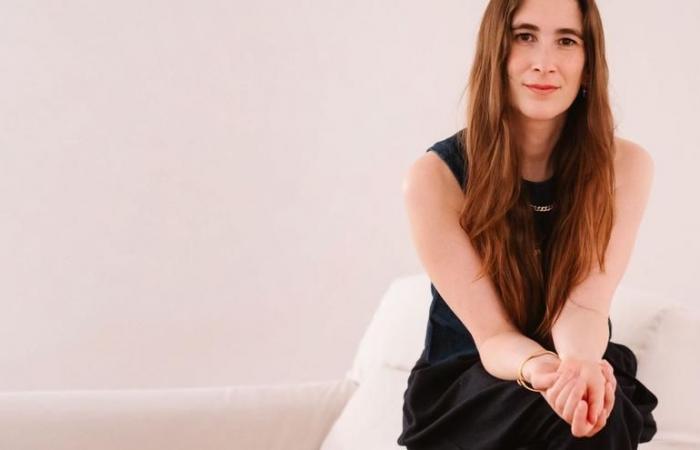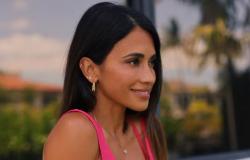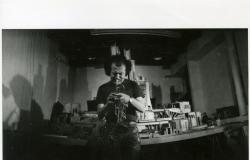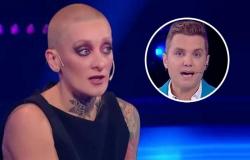“I wanted to tell an exciting adventure, but also bring philosophy closer to children”
He says that one of his hobbies is walking on rooftops. She spent part of her childhood years climbing trees in Harare (Zimbabwe), where she lived with her family – father a diplomat and mother a university professor. Without a doubt, her experience marked him and left him with a deep love for nature that can be felt in her books, written primarily for childhood. He began publishing early, and at 36 years old he has already won numerous awards with his previous books -Sophie in the Skies of Paris (Salamandra, 2022), The Explorer of the Amazon (Salamandra, 2020) or The Good Thieves (Salamandra, 2021)- , but it has been this year that has elevated Katherine Rundell (Kent, England, 1987), after winning the most important literary award in the United Kingdom: Author of the Year (at the British Book Awards). She has achieved this thanks to her most recent work, a book for girls and boys from 9 years old, Impossible Creatures, the first book in a fantastic trilogy that has put her in the orbit of creators such as Tolkien, Ursula K Le Guin, Philip Pullman or CS Lewis (author of The Chronicles of Narnia), who claims to be his great reference from childhood.
It is her first fantasy book, which she has wanted to enter as an author, she says, precisely because the books that had the greatest impact on her as a child were these types of novels. Rundell advocates children’s literature for all audiences and is praised by authors such as Philip Pullman, Michael Morpurgo and Niel Gaiman. She is settled in London, where she lives with her partner. A few days ago, she briefly passed through Madrid to present the Spanish edition of her novel and spoke to this newspaper.
–What attracted you to the world of fantasy to write Impossible Creatures?
–It is a way to bring girls and boys closer to great ideas -evil, power, love, courage, hope…-. I think it allows them to approach philosophy in a very beautiful way. I wanted to write something that was both: an exciting adventure, but also something that allowed girls and boys to think about the real world.
–It is a novel with a complex structure that delves into some great themes. It does not treat the reading public in a condescending manner. Is this perhaps one of the reasons for your success?
–It’s something I’ve put a lot of effort into. One of the things I hated most as a child was being treated condescendingly. I think that girls and boys do not have as much knowledge as adults, and perhaps they do not have the same inner life, but they have the same intelligence, the same depth of emotional power and I would even say that they often have a finer sense of injustice. , I think that adults are often a little dulled by the commitments of our lives, but boys and girls feel justice very deeply and I wanted to write a book that recognized that childish intelligence.
–Impossible creatures is a song of love for nature as something unique that must be preserved. There is a lot of respect for living creatures – it includes a detailed bestiary – and the plot revolves around the adventures of a group of creatures, led by a boy and a girl, to save the world in which they live. Did you want to launch an environmental message in times of climate crisis?
–It was completely intentional, yes. I think that children experience the climate crisis, the extinction of animal species with great anxiety, and I wanted to write a book that recognized the situation, but also said: your effort will be worth it; Your work, your fight and your perseverance will be worth it. The time to give up is never. Furthermore, the book also wants to be a metaphor for the idea that we are losing something that will never come back and what we do about this.
–In your book there is a fantasy world, but it has a Senate –itinerant- of wise men. Its members are described as people deeply concerned about destruction, but also very slow, because they love long processes. Is this your idea of the political class?
–Yes. Urgency is something difficult to convey to politicians. With this Senate I wanted to reflect the idea that you can have very good intentions and still fail to achieve what is necessary. And that sometimes you have to take action outside of institutions in order to deal with real emergencies.
–What is Leonardo da Vinci doing in the middle of this fantasy world? How did it occur to you to create a character based on the Renaissance artist?
–I wanted to include something from the real world to create doubt about whether what the book tells is real or a fantasy and give it elements of a true story. One beautiful thing that is happening to me with this book, which was published in Great Britain almost a year ago, is that my readers come up to me and say: “obviously this story is not real, but I have to make sure. Is it a true story or not?” It’s something that I love, and I think Leonardo da Vinci is helping me a little with that, because I’m sure many think that if it appears here it’s because the story is real and this world exists somewhere. In the book I play a little with that idea of myth and reality, also with the figure of Henry VIII between the two worlds, that of fantasy and the real one.
–In relation to Leonardo da Vinci there is a very bad bad guy, who acts to destroy the world. However, he does not condescend to death…
–Essentially, what I wanted is to personify the way in which power corrupts, what happens when we crave power in such a way that it is the only thing that matters, everything that takes away that, which is a way of exemplifying the that we see in the world today with the climate crisis. We know that the accumulation of power in a single person, historically, often goes wrong. I wanted to show that, to offer an idea that the only way for humanity to function, or for citizenship to function, is to share power. But I also wanted to create an evil character that was scary and exciting in an adventure novel, of course.
–This book has made you Author of the Year in Great Britain, above all other literature published in 2023, not just children’s books. How did you feel when you received the award?
–Well, it was an absolute surprise, exciting, but the truth is, the only reason why I care about this award is if I can attract the attention of more boys and girls so that they read it. Also for adults, I would like them to read it.
–You have always claimed this, that all adults should read children’s novels. In fact, he published a 50-page essay dedicated to precisely this: Why you should read children’s books, even though you are so old and wise, Bloomsbury Publishing, 2019 , still untranslated in Spain). I imagine this resonated with you when you received the award…
-Of course. I hope more adults read this book. I would like children to read it, adults to read it, adults to read it to the children around them… My argument is that when adults read children’s books they access a part of their being that is normally hidden, buried. and I think it is a good way to look for that more idealistic part that we all have in childhood, more vulnerable and with a less constrained passion.
–You have already tried the field of literature for adults, but your work is mainly in children’s literature. Is the public exposure that this award offers you an impetus to maintain your work as a children’s writer or does it encourage you to look for a career As an author for adults?
–I think I would like to be able to alternate both, because I love writing Nonfiction for adults. In fact, I recently published an essay (I think it has not yet been published in Spain) about endangered species entitled El topo de oro y otros Tesoros Vivines (The Golden Mole: and Other Living Treasure, Faber & Faber, 2022). . But if I had to choose, I would definitely choose children’s literature, because you write for a group of people who are in the process of defining who they are, of shaping their true being, and books have a profound impact on this process, they accompany them. rest of his days.
–Are you already working on the second book of the trilogy or do you have other projects in hand as well? What would you like to be able to do in the short or medium term?
–I would like to continue exploring Non-fiction for adults, always getting closer to the natural world. Now, in addition to the second part of Impossible Creatures, I have a novel project for adults that I have been working on for fifteen years. We’ll see which way it goes. I am also writing for films, a very interesting discipline although I don’t like it as much as fiction, but it teaches you many things.
–Will we then see Impossible Creatures on screens in the future, could it be?
–It could be, we have already received offers, but it is difficult to transfer a fantastic story with so many impossible creatures to audiovisual. It’s very expensive and I’d almost rather have no film than a poorly transferred film, so I’m waiting for the right person to take it on.






